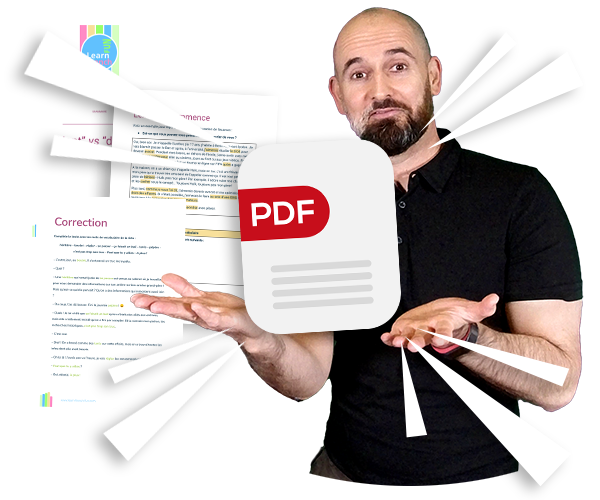Hey students! Today I’m going to teach you about the tonic pronouns in French. These are important little words that you’ll need to know how to use properly in order to make yourself understood by French native speakers. So without further ado, let’s get started!
- What is a French tonic pronoun?
- Why and how are French tonic pronouns used?
- First situation of use of French tonic pronouns: strengthening a name or a pronoun.
- 2. The French tonic pronoun after a preposition.
- Third possibility to use French tonic ponoun, the case where we use the tonic pronoun by itself.
- 4. French tonic pronoun with “also” (aussi) or “neither” (non plus)
- Summary
There are many pronouns in French: direct pronouns (le, la, les), indirect pronouns (lui, leur), en and y pronouns, and tonic pronouns (moi, toi, lui). We will work on these last ones, the tonic pronouns in French.

PDF Bonus
We have prepared a free PDF to help you all about the tonic pronouns in French. 👉 Download it for free
You will find a summary of the lesson, exercises to practice and the correction.
- “You’re talking to moi ?”
OK, this is not Robert De Niro in “Taxi Driver”, but the idea is here:
- To me? You’re talking to me?
So, I don’t know why, but even very good students don’t always understand when and why they have to use pronoms toniques.
So we will see together.
What is a French tonic pronoun?
Take the list of subject pronouns: je, tu, il, etc, and in correspondence, the list of tonic pronouns.
So you have :
| the subject pronoun… | …matches the tonic pronoun. |
| je tu il elle nous vous ils elles | moi toi lui elle nous vous eux elles |
It’s easy, so now you have to memorize them to use them when necessary. And yes, it may seem like a detail, but it is important.
Mastering the use of French tonic pronouns is ESSENTIAL if you have to pass a French exam. You can read our top tips for taking your next French exam in this article.
So the next question is: When do we use a tonic pronoun in French?
Why and how are French tonic pronouns used?
To use a tonic pronoun there are four situations:
- First situation, to reinforce a noun or pronoun.
- Second situation, just after a preposition (à, de, chez, avec..).
Don’t worry, we’ll give examples for each situation.
- Third situation when the tonic pronoun is used alone.
- Fourth situation, with “also” (aussi) or then “neither” (non plus).

PDF Bonus
We have prepared a free PDF to help you to understand the tonic pronouns. 👉 Download it for free
You will find a summary of the lesson, exercises to practice and the correction.
So let’s go back to the four situations.
Do you like learning French with videos?
Receive our free video newsletter every Friday in your e-mail box. You will get 3 “Tips & Tricks” on grammar, vocabulary, phonetics or French culture.
👉👉 Sign up now!
First situation of use of French tonic pronouns: strengthening a name or a pronoun.
Let me explain.
Reinforce, this means that we will bring more strength, more impact on the noun or pronoun.
We will therefore use the tonic pronoun to bring more impact to the sentence. Let’s take an example, a classic phrase:
Je m’entraîne 5 fois par semaine
(I exercise five times a week.)
A sentence with the tonic pronoun:
Moi, je m’entraîne 5 fois par semaine
(Me, I exercise five times a week.)
You see that it brings more impact, more force in the sentence. We can clearly see in this example that the moi, the French tonic pronoun moi is not necessary, it is not obligatory. You understand the sentence when I don’t use moi.
👉 But it’s stronger, I want to insist, I want to give impact to the sentence.
Let’s take another example:
You (toi), Hanz, you don’t play sports at all.
You see that here I am using the pronoun tonic “you” (toi) to mark that it is specifically Hanz who doesn’t play sports at all.
Let’s see the second situation.
2. The French tonic pronoun after a preposition.
Est-ce qu’elle vient avec nous ?
(Is she coming with us?)
Vous allez chez eux ?
(Are you going to their place?)
So in this situation, the student’s problem is good know the list of French tonic pronouns, because it is possible to be wrong and mix the tonic pronouns with indirect complement pronouns and make a bit of a big salad, and make a sentence which is not correct.
It’s your job to you, to memorize well tonic pronouns and see in the sentence:
- Is it a verb which is used in the normal way, usual, with indirect supplement like téléphoner à quelqu’un (calling someone)? There, it is an indirect complement?
- Or, is the pronoun tonic coming, to specify, which is added, because it is after a preposition?
But do not worry, we are going to make a specific video on complement pronouns direct and indirect, may be a specific video for direct supplements, another for indirect supplements, because it’s really often the question that students ask me.
Christian, why do I have to say:
- Je lui téléphone, je l’appelle? When is that …?
- No problem, we will see that in detail.
Third possibility to use French tonic ponoun, the case where we use the tonic pronoun by itself.
Question:
- Qui veut du gâteau ? (Who wants cake?)
- Moi ! (Me!)
Obviously! 😅
In this situation, the tonic pronoun is his all alone sentence. You see there is no need to use a verb, to use something else.
The tonic pronoun by itself expresses a complete idea that allows you to understand.
Qui veut du gâteau ? Moi !
The “me” (moi) is sufficient. I don’t need to say:
Moi, je veux du gâteau.
(Me, I want cake.)
Moi. Everyone understands because before there is the question which allows us the answer to understand.
And finally, the fourth situation when we use the tonic pronoun with “also” (aussi) or then “neither” (non plus).
4. French tonic pronoun with “also” (aussi) or “neither” (non plus)
This situation happens in an exchange, in a dialogue with someone.
When we take up a sentence, when we answer and for example, when we repeat an affirmative sentence, we are going to use the “me too” (moi aussi).
Example:
– J’aime les sushis (I love sushi)
– Moi aussi. (Me too.)
Or when we resume a negative sentence:
- Je n’aime pas le thé I don’t like tea (negative sentence)
negative response which takes up the same idea:
- Neither does he (lui non plus)
- I don’t like tea.
- Neither does she (elle non plus).
It means that me, I don’t like tea and she, also, she doesn’t like tea.
So quite simply, with the tonic pronoun and the form neither (non plus), the answer is sufficient. We have the full answer.
Summary
So, to sum up what we just saw:
1. It is important to memorize the list of tonic pronouns.
Which pronoun? For what form?
📌 Remember that you have the “little Bonus PDF” to help you with that 😅
2. We use a tonic pronoun to reinforce a pronoun or a noun.
Example:
Moi, je le fais.
(Me, I do.)
3. We use a tonic pronoun after a preposition.
Example:
Come with me (viens avec moi),
4. We use a tonic pronoun alone.
Example:
– Qui en veut ?
– Moi !
– Who is coming ?
– Me !
5. And we use a tonic pronoun in a response, with “also” (aussi) or “neither” (non plus).
Example:
I like football. Lui aussi.
I do not like football. Lui non plus.
Conclusion
Well, that’s it for tonic pronouns! I hope you’ve enjoyed this short lesson. If you want to learn French from a native speaker and explore the language with other students online, sign up for our live course today!
We offer flexible prices and can help you find a class at your level of fluency.
And don’t forget about all those extra features we have! Signing up is easy – just visit learn-french-fun.com
Articles that might interest you:
- The Imperative in French: How to Conjugate Verbs in Imperative? When do You Have to Use the Imperative?
- The 10 Irregular Verbs in the French Subjunctive Mood
- Depuis, pendant, en, il y a, dans
- All the secrets of the French gerund!
- French verb moods
- How to use the tonic pronouns in French?
- How to use “en” and “y” pronoun in French?
- Difference between DONT and DUQUEL in French
- 10 common French verbs conjugated in the present tense. Beware of traps!
- The Direct Object Complement in French (C.O.D.) and direct complement pronouns (le, la, les…)




2 thoughts on “How to use the tonic pronouns in French?”
Comments are closed.